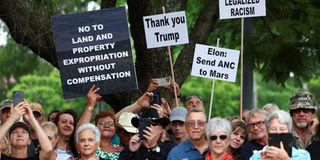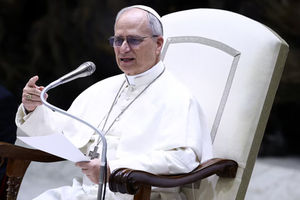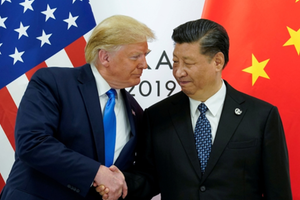First white South Africans go to US under Trump refugee plan

Demonstrators hold placards in support of U.S. President Donald Trump's stance against what he calls racist laws, land expropriation, and farm attacks, outside the American Embassy in Pretoria, South Africa, February 15, 2025. PHOTO | REUTERS
What you need to know:
- The U.S. government has blocked mostly non-white refugee admissions from the rest of the world but is prioritising Afrikaners, the descendants of mostly Dutch settlers.
Johannesburg. The first 49 white South Africans deemed victims of racial discrimination and granted refugee status under an offer by U.S. President Donald Trump were flying to the U.S. on Monday in a move deepening frictions between the two nations.
The U.S. government has blocked mostly non-white refugee admissions from the rest of the world but is prioritising Afrikaners, the descendants of mostly Dutch settlers.
Giving refugee status to white South Africans has been met with a mixture of alarm and ridicule by South African authorities, who say the Trump administration has waded into a domestic political issue it does not understand.
It comes at a time of heightened racial tensions in South Africa over land and jobs that has divided the ruling coalition.
The charter plane carrying the 49 from Johannesburg was expected to arrive at Washington Dulles airport on Monday morning. People familiar with the matter said the South Africans would participate in a press conference before boarding flights to different U.S. destinations.
Sources told Reuters some were heading to Democratic-leaning Minnesota, which has a reputation for welcoming refugees, while others planned to go to Republican-led states such as Idaho and Alabama.
South Africa maintains the 49 are not refugees. "They do not qualify for that status, according to us," said foreign minister Ronald Lamola at a press briefing on Monday.
"There is no data at all that backs that there is persecution of white South Africans," he added, saying crime in South Africa affects everyone irrespective of race.
Wealth inequities
Since Nelson Mandela brought democracy into South Africa in the 1994, the once-ruling white minority has retained most of the wealth amassed under colonialism and apartheid.
Whites still own three-quarters of private land and have about 20 times the wealth of the Black majority, according to international academic journal the Review of Political Economy.
Less than 10 percent of white South Africans are out of work, compared with more than a third of their Black counterparts.
Yet the claim that minority white South Africans face discrimination from the Black majority has become an established trope in right-wing online chatrooms, and has been echoed, opens new tab by Trump's white South African-born ally Elon Musk.
Three white South Africans who had first-round interviews at the U.S. embassy in Pretoria told Reuters that officials asked questions about their experiences with land disputes, crime and perceived racial discrimination.
South Africa's President Cyril Ramaphosa signed a law this year that aims to address racial disparities in land ownership by making it easier for the state to expropriate land in the public interest, which has caused concern among some white South Africans although no land has been seized.
Since his return to the White House in January, Trump has cut all U.S. financial assistance to South Africa, citing disapproval of its land policy and of its genocide case at the International Court of Justice against Washington's ally, Israel.
A spokesperson for the U.S. Department of Health and Human Services said on Friday that it was working with the State Department to support the South Africans' resettlement using existing funding, without giving details about what kind of assistance they would receive.
"ORR (Office of Refugee Resettlement) is coordinating closely with federal, state, and local partners to ensure these refugees receive the services needed to safely and successfully integrate within our country," the spokesperson said, adding that more arrivals were expected in the coming months.
The aid organization Church World Service also said on Friday that it was open to helping resettle the South Africans despite having concerns about them being fast-tracked.





